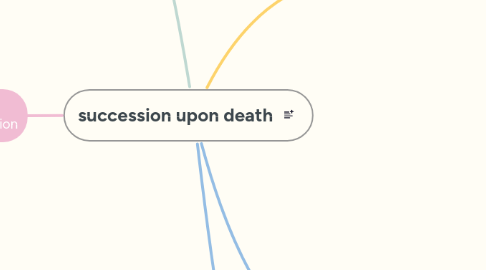
1. testamentary freedom
1.1. both in common and civil law ∃ share in favour of certain fam member.
1.2. is unlimited in common law
1.3. for a certain share in civil law is belonging to whole family
1.3.1. testator can dispose of a max of 25% of his/her asset ⇒75% persons entitled/legittimari
1.3.1.1. NON-DISPOSABLE PORTION/LEGITIMATE PORTION is computed by
1.3.1.1.1. testamentary asset
1.3.1.1.2. fictitiously adding donations made while deceased was alive
1.3.1.2. spouse
1.3.1.2.1. separate spouse • alimony⇒form of annuity • retains all rights of succession
1.3.1.2.2. etitled to maintain previous abode and has the right to use furniture theirein included.
2. types of WILL
2.1. PRIVATE wills +) cheap +) secret - ) prone to error and fraud - ) potentially unsafe
2.1.1. holograph will
2.1.1.1. handwritten + signed by testator
2.1.1.1.1. identification
2.1.1.2. dated by testator
2.1.1.2.1. assess capacity testator
2.1.1.2.2. assess chronological sequence of conflicting wills
2.1.2. witnessed will
2.1.2.1. usually not written by testator but signed by the latter before two witnesses
2.1.2.2. Common law
2.2. PUBLIC will +) made w/legal advice ⇒safe +) regard of intentions of testators - ) expensive - ) unwelcome publicity
2.2.1. notarial will
2.2.1.1. regulated by notarial law; notary writes testator's will, after the letter declared it. subsequently notary reads what had been drafted in writing before two witnesses.
2.3. SPECIAL will +) less formality required
2.3.1. occurs in case of calamity/war time/shipwreck/aircraft crash
3. succession by will / testamentary succession
3.1. regulated by disposition of WILL
3.1.1. revocable act/deed, by which persons dispose of a part or the entirety or their property, for such a time as they shall cease to be.
3.1.1.1. can be widrawn at any moment due vices of will
3.1.1.2. legal instrument for persons to freely decide to whom their universality at law would be passed on.
3.1.2. become effective = testator ceases to be (certainty of info)
4. • personal ties are not bequeathed • rights not passed down = alimony, usufruct, habitation, contract for work • rights passed down = copyrights • legacies can be renounced (are specific/general) • universality at law ⇒succession under universal title = ∄ distinction between assets + liabilities
4.1. in IT are void
4.1.1. succession agreements
4.1.1.1. ≠ BGB Erbvertrag: testator (person drafting a will) may lay down binding provisions for a future succession.
4.1.2. joint and reciprocal wills
4.2. disinheriting
4.2.1. heir at law is lawful
5. cases of unworthiness
5.1. intentionally killed or attempted to kill person, provided that none of causes that exclude criminal libility is present
5.2. one who induced/prevented testator to make/revoke/change will
5.3. one who suppressed, concealed, altered will ruling succession
5.4. one who made/made use of a false will
6. INTESTATE SUCCESSION = succession in absence of a will ↓ entitles persons to a legitimate portion
6.1. 3 categories of intestate successors (legittimari) ∃: • descendants • parents, other ascendants and siblings • other relatives up to sixth degree of kinship
6.2. heirs may renounce/accept inheritance
6.2.1. acceptance
6.2.1.1. before a notary in a formal statement
6.2.1.2. tacit way = heir acts as owner
6.2.2. request recognition of hereditary status
